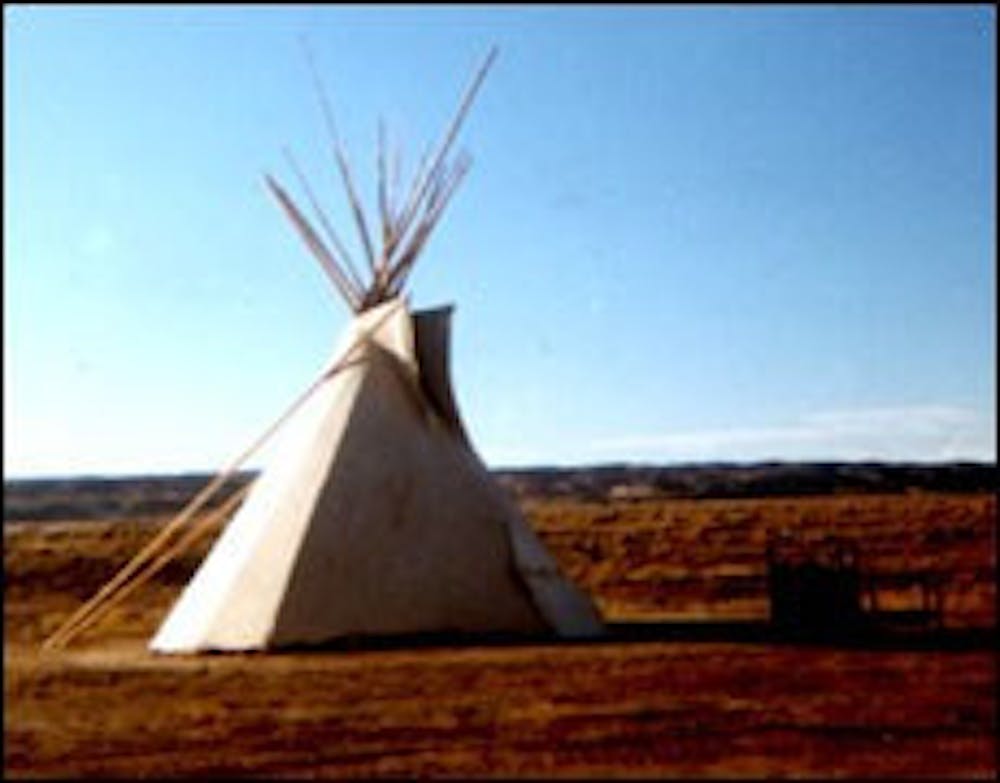"You stand out like a sore thumb," my friend Manuelito tells me as we walk into a little restaurant.
"I know," I say as I look around me.
I am a short, white, blonde-haired thumb in more than a handful of Native Americans in Gallup. The small town in New Mexico borders Arizona and a large reservation. Most of Gallup's citizens are Native Americans, like Manuelito (who does not want his first name used for religious reasons). They have come from the reservation, but they haven't left its traditions completely behind.
Soon, we are on our way to the "Rez," as Manuelito calls it. Manuelito lives in the Phoenix Valley, but he has come here with some problems that he wants a medicine man to look into. His mother is with us. She has come with a few of her own problems-worries about her family.
The reservation is stretched out. We have at least an hour and a half before we reach our destination. The landscape is flat and sandy with little to no vegetation. There are small mountains that dot the view.
Manaltio and his mother start to talk, half in English, half in Navajo, and I am wondering what I am getting myself into. The closest I have ever gotten to a medicine man is watching Dances with Wolves.
We arrive at a small trailer-like house that looks as if it got swept up like Dorothy's farm and put down in the middle of nowhere. In front of the house is a small octagon building, a hogan. Minutes later, an old man in black pants, a large, red shirt and gray hair pulled into a ponytail comes out from the building.
Manuelito addresses the man as Grandpa, even though they are not related by blood. He directs us into the hogan.
Inside, the walls are decorated with pictures of his grandchildren and their awards-images of the man's past and his future.
There is no floor inside, just worn down dirt. I am told to walk clockwise around the stove in the middle of the room. This is to represent the circle of life; one side is youth, the other old age. We stop in the middle.
The medicine man comes in and takes charcoal out of the stove, places it in a pile close to us and puts a stick in it. We sit on the ground on cushions that could have come off a couch, and the man sets his instruments out: a feather, a crystal and a crystal glass.
We're instructed to drink water out of a ladle; it is a sign of friendship, he says.
Now it is time to get down to why we came.
In my religion, we don't believe in using tobacco. I realize what a different world I was in as I watch Manuelito roll a very large cigarette, he lights it and hands it to his "Grandpa." As he smokes, Manuelito explains his situation. The medicine man is able to do something men have been trying to master for years; he just listens.
Next, Manuelito's mother explains her situation in Navajo. Then he turns to me. He calls me granddaughter- his Anglo-granddaughter-and says when we are in here he doesn't see any difference betwee n the two of us. We are all his family.
I haven't had a Grandpa for almost six years now and it was nice to have one again, even for just a little while.
He asks me if I have problems for him. A part of me would have loved to unload all of my issues. Maybe I would have if I had been alone. He looks at me with soft eyes. They are sunken into his skin. In his eyes are wisdom and understanding, but most of all, there are love and acceptance.
He puts cedar on the fire, gets out a feather instrument and blesses each one of us. Then he says some prayers in Navajo and starts to explain to Manuelito unseen reasons for some of the problems in Manuelito's life, telling him to take things one day at a time and to look at the good things in his life. He says this ceremony will start to put things right.
Hours after we went in to the hogan, the ritual is over, and we step out into the cold, refreshing air to say goodbye to Grandpa.
"People come here from all over," he says. Some come from Virginia, Florida and even Canada.
"I don't know how they find about me," he says, "but they do."
As we leave, the medicine man tells me that after I come here, I am always one of his clan. No matter what I look like or where I go, I am still family. That means I still have a Grandpa after all.
Reach the Reporter at samantha.xanthos@asu.edu




